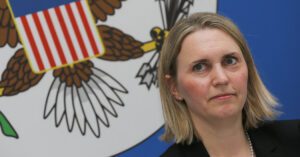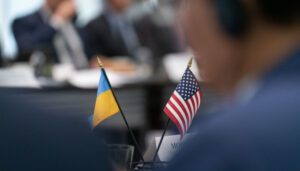
U.S. President Joseph Biden intends to nominate Bridget Brink as U.S. Ambassador to Ukraine.
“Today, President Biden announced his intention to nominate veteran U.S. diplomat Bridget A. Brink to serve as Ambassador Extraordinary and Plenipotentiary to Ukraine,” the White House said on its website on Monday.
Bridget A. Brink, a career member of the Senior Foreign Service, currently serves as the U.S. Ambassador to the Slovak Republic. Prior to that, she served as Senior Advisor and Deputy Assistant Secretary in the Bureau of European and Eurasian Affairs at the U.S. Department of State, with responsibility for issues related to Eastern Europe and the Caucasus. She also served as Deputy Chief of Mission at the U.S. Embassies in Tashkent, Uzbekistan, and Tbilisi, Georgia. Brink spent her twenty-five-year career in the Foreign Service focused on advancing U.S. policy in Europe and Eurasia. She was the Director for the Aegean and the South Caucasus at the National Security Council and served in the State Department as the Deputy Director for Southern European Affairs, Special Assistant to the Under Secretary for Political Affairs, and Cyprus Desk Officer. She began her career in Belgrade, Serbia.
Originally from Michigan, Brink is the recipient of numerous performance awards. She holds Master’s degrees in International Relations and Political Theory from the London School of Economics and Political Science, as well as a Bachelor’s degree in Political Science from Kenyon College. She speaks Russian and has studied Slovak, Serbian, Georgian, and French.

The administration of U.S. President Joe Biden has requested $58.5 billion for fiscal 2022 to support the activities of the Department of State and its goals, according to a document published by the U.S. Department of State on Friday. “The President’s Budget for FY 2022 requests $58.5 billion for the Department of State and USAID,” the message reads.
It is noted that this is 10% higher than the final budget of the State Department in fiscal 2021.
“These resources will position us to advance the Administration’s foreign policy agenda on behalf of the American people. It also reflects the importance the Administration places on U.S. global leadership and the fact that diplomacy and development are vital tools for advancing U.S. interests,” the U.S. Department of State said.
According to the document, it is proposed to allocate a total of $665.8 million for spending in the European region and Eurasia, which, in particular, will help strengthening the resilience of countries to foreign malevolent influence and promoting Euro-Atlantic integration, confronting the growing challenges from Russia and China.
Thus, $88 million of this amount is planned to be allocated to support the democratization of Georgia, its economic development and the creation of resilience to resisting the malicious influence of the Kremlin. In addition, $255 million will be spent on aid to Ukraine to strengthen its ability to withstand Russian aggression. To counter Russian influence and disinformation in the Western Balkans, according to the document, $106 million is required.

U.S. President Joseph Biden will hold his first telephone conversation with Ukrainian President Volodymyr Zelensky on Friday evening, April 2, an informed source from the President’s Office of Ukraine told Interfax-Ukraine.
“We confirm the fact of the call, yes,” the source said.
Earlier, the upcoming conversation between the presidents was reported by the Politico ezine, citing two people who were aware of the planned call.
“Ukrainian officials had been pushing for a call between Zelensky and Biden for weeks, including in a recent call between national security adviser Jake Sullivan and top Zelensky aid Andriy Yermak, according to one person familiar with their conversation,” according to the Politico’s statement on Friday.
It is noted that the conversation follows at least three high-level calls between the United States and Ukraine this week between Secretary of State Antony Blinken, Joint Chiefs Chairman General Mark Milley, Defense Secretary Lloyd Austin and their Ukrainian counterparts.